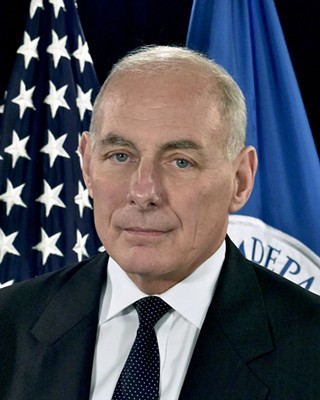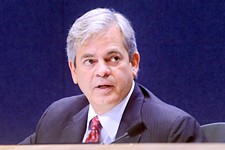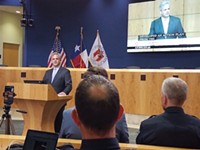No Sanctuary
Adler, mayors, receive “no clarification” from Homeland Security
By Michael King, 6:00PM, Thu. Mar. 30, 2017

Mayor Steve Adler talked to reporters Thursday afternoon about his Wednesday meeting with U.S. Homeland Security Secretary John Kelly, but brought home precious little news to share. There was little opportunity for dialogue, he said, and Kelly offered no Trump administration definition of “sanctuary cities.”
The D.C. meeting was held at the request of the U.S. Conference of Mayors, and in addition to Adler included mayors from Oklahoma City (Mick Cornett, president of the conference), Los Angeles (Eric Garcetti), Dallas (Mike Rawlings), Gary (Karen Freeman-Wilson), and others, as well as several police chiefs and representatives of a few partner organizations (e.g. National League of Cities).
The mayors and chiefs hoped to hear from Kelly some clarification of the administration’s apparent actions against “sanctuary cities” – including Attorney General Jeff Sessions’ threat to “claw back” federal funding from cities and counties not cooperating fully with federal immigration authorities – and perhaps receive some sense of the intended goals of the administration’s new immigration policies.
Adler said that while the brief conversation, mostly dominated by Kelly, perhaps begins a dialogue, and that it is important for Austin “to be a participant in these discussions,” he returned home with little better sense of the administration’s intentions. Kelly offered no definition of “sanctuary cities” – all the mayors involved say they obey the relevant federal laws – and didn’t get into many details about recent Immigration and Customs Enforcement Agency policies and actions.
Specifically, Adler said, there was no opportunity to ask for confirmation of reports that recent ICE raids in Travis County were in part retaliatory, in response to changes in policy from new Travis County Sheriff Sally Hernandez. Neither was he able to ask Kelly why those Travis County raids arrested fewer “criminals” than non-offenders. The mayors were told they could communicate with Deputy Assistant Secretary Alaina Clark, and Adler said he would be adding his own questions to any letters sent by the Conference of Mayors.
Adler said Kelly insisted that his agency’s goals are primarily to get “bad guys” off the streets (that “the overarching intent is to go after material criminals”) and the mayors told Kelly that they shared a central interest in and obligation to public safety. Adler said he supports the efforts of the Travis County Sheriff's Office and the Austin Police Department to prioritize public safety above immigration status, and said what he found “troubling” is “the disconnect between the political and practical elements of this situation.”
Adler said that he’s been told by representatives of local social service nonprofits that their clients are increasingly reluctant to seek services for fear of alerting immigration authorities, and he said police officers cannot jeopardize their “trust relationships” with residents by enforcing federal immigration laws. “Having more officers is all about being able to build stronger relationships,” the mayor said. “There’s only so much time they have, and they’re maxed out already, running from call to call. They don’t have the time or the resources to act as federal immigration agents.”
Adler said he’s uncertain what will happen next on this front, although the city is monitoring both the Legislature and the federal government. The attorney general’s threat to defund jurisdictions not cooperating with ICE cited aspects of the law that Travis County in fact obeys, and moreover, federal law prohibits the U.S. government from imposing federal obligations on lower jurisdictions.
“They may come out with a definition of a ‘sanctuary city,’” said the mayor, “and the courts will likely have something to say.” He noted that the city has already provided amicus briefs in two sanctuary-related lawsuits filed by San Francisco and Santa Clara County, California.
Concerning federal and state threats of economic sanctions, Adler said, “We’re faced with a terrible choice: to act for money in ways that will make us less safe.”
For more on the ongoing immigration story, follow the Daily News and this week’s print edition.
Got something to say on the subject? Send a letter to the editor.
A note to readers: Bold and uncensored, The Austin Chronicle has been Austin’s independent news source for over 40 years, expressing the community’s political and environmental concerns and supporting its active cultural scene. Now more than ever, we need your support to continue supplying Austin with independent, free press. If real news is important to you, please consider making a donation of $5, $10 or whatever you can afford, to help keep our journalism on stands.
Michael King, April 18, 2019
Feb. 3, 2025
Nov. 18, 2024
Steve Adler, U.S. Department of Homeland Security, immigration










